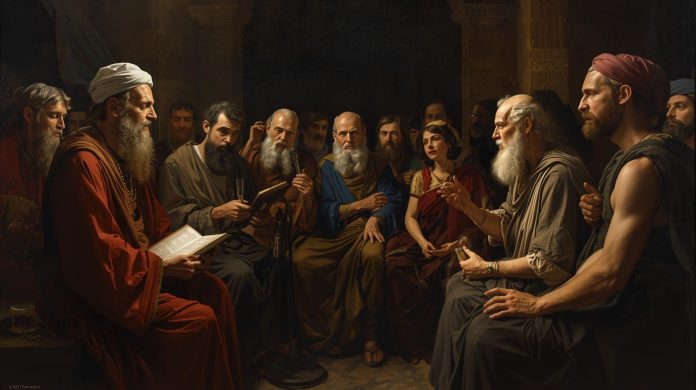People sometimes feel that visiting or talking to a psychic is taboo or strange. But did you know that in past times, entire empires relied on oracles to make life-changing decisions? These weren’t just personal matters—kings and queens delayed wars, founded cities, or abandoned them altogether based on the counsel of seers who claimed to speak to the gods.
Centuries later, the pattern continued. In Ancient Greece and Mesopotamia, leaders still turned to oracles for wisdom that went beyond logic. They believed the voice of a medium or priest could reveal truths no general or advisor could offer.
Fast-forward to today. From temples and sanctuaries to Zoom calls and livestream readings, people still seek psychic and spiritual guidance. The settings may have changed, but the need remains the same: a belief that the spiritual world has something real to offer.
The Ancient Oracles: Mouthpieces of the Divine
In ancient Greece, the most famous was the Oracle of Delphi, where seekers could consult the god Apollo. Pilgrims traveled hundreds of miles to speak with the high priestess Pythia, who would deliver messages while in a trance. Her words were often cryptic, yet rulers believed they carried divine weight (History.com).
The Pythia herself became a cultural icon—her trances, rituals, and ambiguous predictions still fascinate historians (Wikipedia).
But Greece wasn’t alone. In ancient Egypt, priests interpreted dreams as messages from the gods. In China’s Shang Dynasty, people cast oracle bones into fire to receive answers. In Mesoamerica, Mayan priests read the stars to decide when to plant or when to go to war. Everywhere, prophecy was a daily part of life.
Mediums as the New Oracles
Mediums today are like modern oracles. They may not sit in marble temples, but they still bridge the physical and spiritual worlds. Kings and queens rarely seek them out, yet ordinary people still turn to mediums for closure, comfort, and answers about love, loss, or career.
Even celebrity psychics like Tyler Henry recognize the parallel. Stars turn to him much like rulers once traveled to Delphi—seeking reassurance, clarity, or messages from the other side. His televised readings serve the same purpose as ancient prophecy: guiding decisions and soothing anxieties.
Why We Keep Coming Back to Oracles
At first glance, it seems odd that in a data-driven world people still seek mediums. But the hunger for prophecy is timeless:
Uncertainty never left: Wars may look different, but anxieties about love, health, and purpose remain.
Logic has limits: A spreadsheet can’t tell you if your grandmother approves of your choices—but a medium might.
The comfort of connection: Oracles once reassured people that the gods were listening. Mediums today remind us that loved ones are still close.
The continuity is striking: both oracles and mediums translate the unseen into something we can act on.
Oracles of the Past
Not every prophecy was grave or serious. The Oracle of Delphi once warned a ruler that if he attacked, a great empire would fall. Believing it meant his enemy’s downfall, he went to war—only to see his own empire destroyed. Ambiguity was the point.
Likewise, modern psychic readings can carry humor. Spirits sometimes deliver playful messages: reminders not to burn the toast, jokes about borrowed clothes, or affectionate teasing. These moments reveal that the spiritual world is full of personality, not just solemn warnings.
Oracles as Therapists Before Therapy Existed
Oracles were, in many ways, the first therapists. They helped people reflect on their lives, weigh choices, and find courage. Today, oracles offer the same comfort. A grieving parent might enter a reading with unbearable sorrow but leave knowing their child is safe and still connected in spirit.
Science focuses on data, but spirituality focuses on healing. Ancient oracles gave rulers courage to lead, and today’s mediums give everyday people hope, closure, and resilience.
The Persuasive Power in Precision
The Oracle of Delphi once predicted that Croesus would fall, and indeed he did. Mediums today also deliver predictions that can come true, blending intuition with connection to the unseen.
Modern research has even shown that people who report mediumistic experiences share measurable psychological traits, suggesting a unique sensitivity rather than pathology (PMC study).
Academic studies also reveal how psychology has historically resisted taking mediumship seriously, sometimes dismissing it as superstition rather than exploring its cultural role (University of Cambridge). This echoes how skeptics treated ancient oracles: with doubt, but also with a grudging acknowledgment of their influence.
Lessons We Can Learn from the Past
In temples, oracles guided seekers through ritual, meditation, and cryptic prophecy. Today, mediums continue that tradition with candles, cards, and quiet reflection.
The wisdom of both oracles and mediums lies not in dictating choices but in offering insight. They remind us that the future is not fixed—it bends with the choices we make. Spiritual guidance helps us align those choices with healing, purpose, and peace.
Final Thoughts: Echoes That Refuse to Fade
Though the oracles of the past belong to history, their echo lives on in every psychic reading. Mediums today may use tarot cards or livestream sessions instead of temple rituals, but their purpose is the same: to remind us that we are never alone.
People have never stopped seeking guidance—from rulers shaping empires to everyday people navigating love and loss. Oracles once gave hope and courage, and mediums still do.
Next time you consult a psychic, remember: you’re stepping into a tradition thousands of years old, where the whispers of the past still guide the questions of the present.
Oracles FAQ
What is an oracle, in plain language?
An oracle is a person or process believed to translate messages from the unseen world into practical guidance. In the past this meant temple rituals; today it might be a medium’s session, tarot spread, or trance.How is an oracle different from a medium?
Oracles historically spoke on behalf of deities for a community or ruler; mediums focus on personal messages, often from loved ones in spirit. Both act as interpreters, but the audiences and methods differ.Did oracles tell people what to do?
They offered insight, not orders. Ancient responses were famously ambiguous to preserve free will. Good modern readings do the same—clarify options, illuminate consequences, and leave the choice to you.Are oracle-style messages always cryptic?
Not always. Some messages are symbolic (great for reflection), others come through plainly. A skilled practitioner clarifies symbolism into actionable guidance before the session ends.Can an oracle or medium predict the future with certainty?
No. The future is shaped by choices, timing, and context. Accurate guidance describes trajectories and thresholds—what strengthens or weakens an outcome—rather than fixed fates.How should I prepare for an oracle/medium-style session?
Set an intention, bring a few well-formed questions, be open to unexpected topics, and take notes. Afterward, give the insights time to “land” before making big decisions.What’s a good question to ask?
Ask “how” and “what” questions that open paths: “What’s the most aligned next step for my career?” “How can I heal this relationship pattern?” Avoid yes/no when possible.How do I know a message is really for me?
It carries specificity (names, dates, personal quirks), emotional resonance (goosebumps, relief), and practical relevance (you can apply it). If it’s vague or fear-based, ask for clarification.Can oracular guidance replace therapy, medical, or legal advice?
No. It can complement professional care by adding meaning, timing, or emotional validation, but it shouldn’t substitute for licensed advice.Were there oracles outside Greece?
Yes. Dream oracles in Egypt, oracle bones in early China, Ifá divination in West Africa, and star-based priestly guidance in Mesoamerica are all culturally distinct forms of oracular practice.What modern tools echo ancient oracles?
Tarot, runes, pendulums, scrying, trance mediumship, and automatic writing. The container changes; the core intent—seeking wise discernment—remains.How do I choose a reputable modern practitioner?
Look for clear ethics (no fear tactics), transparent pricing, testimonials that mention specificity, and a focus on empowerment. Trust your intuition, and start with a short session to gauge fit.





Honestly, I found this article surprisingly eye-opening. As someone with a pretty low level of knowledge about history or spirituality, it made me think differently about psychics. It’s not just weird stuff—it’s got roots! 🤯
Meh, just because people used to do something for centuries doesn’t mean it was smart or true. We also used to bleed people for fevers.
Exactly! I used to laugh at this stuff but now I’m like, wow, it’s part of human culture since forever. Makes you think maybe there’s more to it than we know.
As a history teacher with a high intellectual interest in ancient cultures, I find the parallels drawn between ancient oracles and modern mediums genuinely compelling. The continuity in human emotional needs is clearly evident here.
So we’re comparing Twitch psychics with Apollo’s mouthpiece now? That’s rich 😂 What’s next—comparing fortune cookies to sacred scrolls? Please give me a break.
I’m no expert but even I can tell most of these so-called ‘mediums’ are just playing guessing games. Cold reading ain’t divine insight—it’s psychological manipulation for cash.
As someone who’s lost both parents recently, this piece really touched me. Whether it’s real or not, visiting a medium helped me feel closer to them again—and that kind of comfort is priceless 💖
“Modern psychics are today’s therapists”? That’s quite a stretch if you ask me. Licensed professionals go through years of training; mediums just need a deck of cards and good storytelling skills.
@Allison Mack Some people say their lives were changed by one session with a medium. If healing happens, does it matter how?
I appreciate how the article connects anthropology with spiritual practices without being preachy. It reminds us that rationality alone doesn’t fulfill every aspect of our lives—some things are simply felt rather than calculated.
This article beautifully underscores the human longing for certainty and connection beyond logic. While I’m skeptical of some modern psychics, the therapeutic value they offer should not be underestimated.
So basically we traded golden temples for neon-lit Zoom calls and expect the gods to keep up? If anything proves humans never change, it’s this mystical hotline evolution 🔮😂
Let me get this straight: thousands of years ago someone got high on fumes and told kings what to do—and now we watch Tyler Henry on Netflix and call that wisdom? Love humanity sometimes 😂